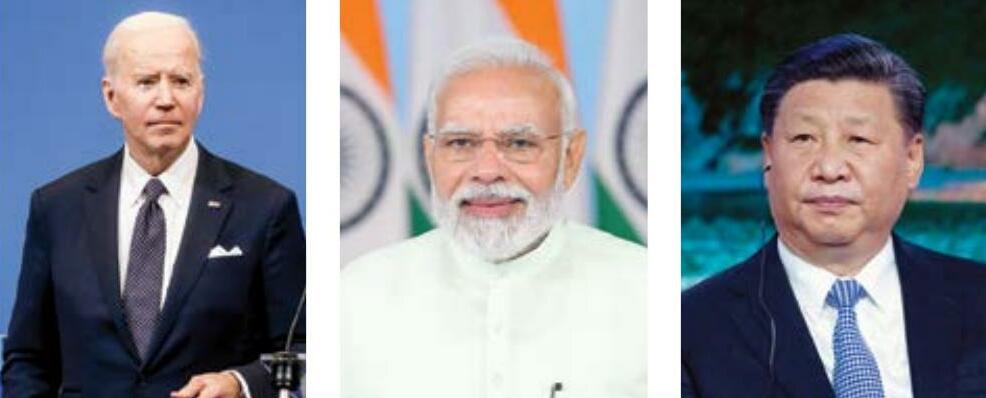
US President Richard Nixon, later disgraced by the Watergate scandal, reflected influential views of the day in Washington when he made disparaging remarks about Prime Minister Indira Gandhi (many of them unprintable). He sent the US Seventh Fleet to the Bay of Bengal in December 1971 to intimidate India during the Bangladesh war.
India was a tiny economy. Food shortages had plagued it through the 1960s. But transactional relationships can change abruptly. As India's economy grew, the West reassessed its geopolitical priorities. President Bill Clinton had imposed harsh sanctions on India following the Pokhran II nuclear test in May 1998. Within two years, on a visit to India, Clinton changed his tune. He saw first-hand how India, then a nascent software power, had used the Y2K dot com crisis to emerge as a potential global technology leader.
The West's discovery of India had begun. The India-US civil nuclear deal in 2008 followed. China was meanwhile quietly stealing US technology and intellectual property rights to propel itself into the world's second-largest economy. In 2000, China's GDP was a mere $1.21 trillion. In 2006, it was $2.76 trillion, less than India's GDP today. But within another eight years, by 2014, Chinese GDP had quadrupled to $10.48 trillion.
Washington, following the Nixon-Kissinger visit to China in 1972, facilitated by Pakistan, had moved decisively against India. It has taken half a century for the US to reverse and rewrite its Indo-Pacific doctrine. While the India-US nuclear deal set the direction of future ties, China's toxic threat dawned only gradually on Washington. It realized belatedly that during former leader Deng Xiaoping's hide-and-bide strategy, China had converted itself into an economic powerhouse by reverse engineering patented US technology.
This story is from the {{IssueName}} edition of {{MagazineName}}.
Start your 7-day Magzter GOLD free trial to access thousands of curated premium stories, and 9,000+ magazines and newspapers.
Already a subscriber ? Sign In
This story is from the {{IssueName}} edition of {{MagazineName}}.
Start your 7-day Magzter GOLD free trial to access thousands of curated premium stories, and 9,000+ magazines and newspapers.
Already a subscriber? Sign In

MEMORIES & IMPRESSIONS
Ratan Tata was an exceptional human being. He was a visionary leader, esteemed industrialist, and a humanitarian, who left an indelible mark on India and the world.

The Robotaxi Market
The robotaxi market is shaping up to be a high-stakes battleground as tech giants and automakers race to transform urban mobility.

And the Nobel Prize Goes to AI
The recent Nobel Prize T awards to AI pioneers affiliated with Google have sparked a broader conversation about Big Tech's influence on research and the limitations of traditional prize categories.

Ola Electrified
Once considered a trailblazer in India’s electric vehicle (EV) ecosystem, Bhavish Aggarwal’s Ola Electric now faces a major accountability crisis.

Sharp Slide in Industrial Output on Eve of Deepavali
India’s index of industrial production (IIP) saw a sharp reversal in August, contracting by 0.1 per cent, in stark contrast to the 4.7 per cent growth in July, mostly because of significant contractions in mining and electricity generation.

Heralding the Solar Era with Sustainable Electrification
RAJEEV KASHYAP on the economics of solar power, the hurdles in scaling it, and much more

A WELL-GREASED MACHINE
The OmniBook X14 laptop runs on first-generation Snapdragon X Elite, which bets big on Al-enabled productivity and battery life, but falls short when it comes to overall experience, says Deep Majumdar

DO NOT LETA HEALTH CRISIS RUIN YOUR FINANCIAL HEALTH
For a family of four living in a metro, it is recommended to opt for a family floater health insurance plan with a sum insured of at least Rs 15-20 lakh

Disruption Ahead: Beyond Organisation Charts and Structures
ALBERT EINSTEIN FAMOUSLY said, “We cannot solve our problems with the same thinking we used when we created them.

Dr. Rahul Shivajirao Kadam: A Visionary Leader Blending Sustainability, Innovation, And Social Empowerment
We are on the stage of global warming, and these technologies not only help prevent further damage but also leave behind a better environment for future generations.